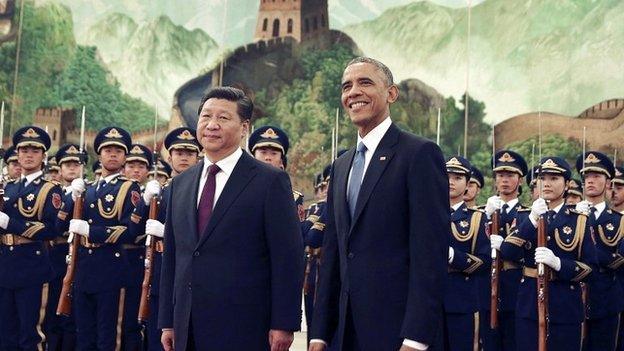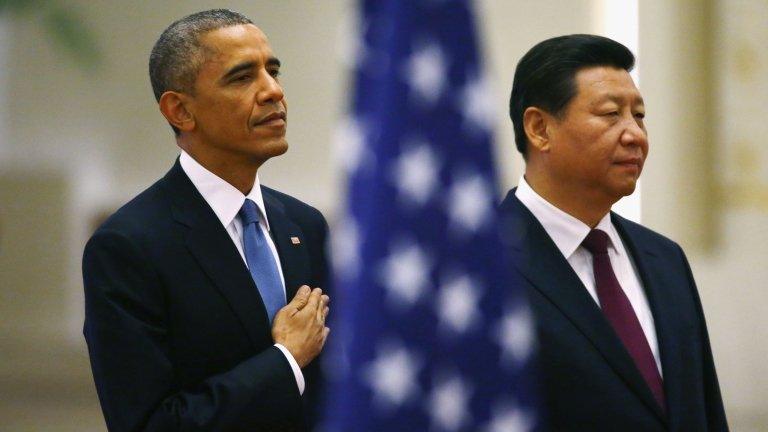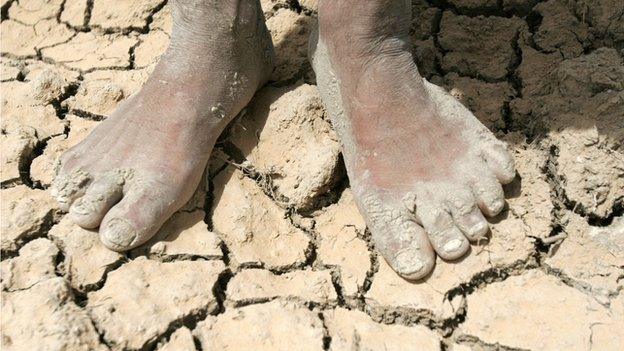US makes climate pledge to UN
- Published

Mr Obama made an informal pledge on climate change when he met his Chinese counterpart
The US has pledged to tackle climate change by cutting its carbon emissions 26-28% by 2025.
It made the formal offer to the UN as a step towards a global deal in Paris in December.
The EU has already promised to cut its emissions by a roughly similar proportion.
Tuesday was the deadline for wealthy nations to make their offers – but some, such as Canada, have failed to submit in time.
The announcement was made on Twitter with the words: "America is taking steps to #ActOnClimate, and the world is joining us" - accompanied by a picture of the President in China.
The US announcement, external said: "The target is fair and ambitious. The United States has already undertaken substantial policy action to reduce its emissions. Additional action to achieve the 2025 target represents a substantial acceleration of the current pace of greenhouse gas emission reductions.
"Achieving the 2025 target will require a further emission reduction of 9-11% beyond our 2020 target compared to the 2005 baseline and a substantial acceleration of the 2005-2020 annual pace of reduction, to 2.3-2.8 percent per year, or an approximate doubling."
Analysts examining the promises made by the first few nations to commit say they are not strong enough to hold global temperature rise to the internationally agreed maximum of 2C.
The early deadline was set for rich nation submissions because the UN is desperate for the Paris meeting to avoid a repeat of the shambolic gathering in Copenhagen in 2009 that failed in its aim of protecting the climate.
Todd Stern, the US chief climate negotiator, previously told BBC News that America’s contribution would be “quite ambitious”.
But he warned that the Paris process would not itself solve the climate problem. That, he argued, would need ongoing effort over decades.
Road ahead
The US has a climate action plan announced in 2013 with new restrictions on power plant emissions and tougher standards on vehicles.
But President Obama's policies are being strongly resisted by Republicans in Congress and the law courts, and other nations have been watching keenly to see if he would formally submit the offer to the UN.
The EU has offered to cut emissions 40% on 1990 levels by 2030 (the US offer is based on a 2005 baseline). Switzerland and Mexico also unveiled pledges.
China is expected to offer to peak emissions by 2030 at the latest, and to produce 20% of its energy from nuclear and renewables by the same date.
Dr Jeremy Woods, who runs Climate-KIC's Global Calculator project at Imperial College London, said: “The declarations are an important first step. However, since most experts agree that all of the intended pledges will not be enough to limit global warming to 2C, it’s vital that the international community has a clear view of the scale of the challenge ahead.
“Over the last decade, the EU’s emissions have shrunk, the US’s have remained more-or-less stable but China’s have risen dramatically from just over 10% of global emissions in 2000 to just under 30% in 2013. The world has been going in the opposite direction to that needed to reduce global greenhouse gas emissions.
"Unless major emitters (governments and businesses alike) can find ways and reasons to dramatically change course we will move into uncharted and dangerous waters very soon.”
Mr Stern said: “You can look at the US, the EU, China - you could say I wish they did a little more than that. It’s not perfect - but then nobody is.”
Follow Roger on Twitter, external.
- Published12 November 2014

- Published1 April 2015
